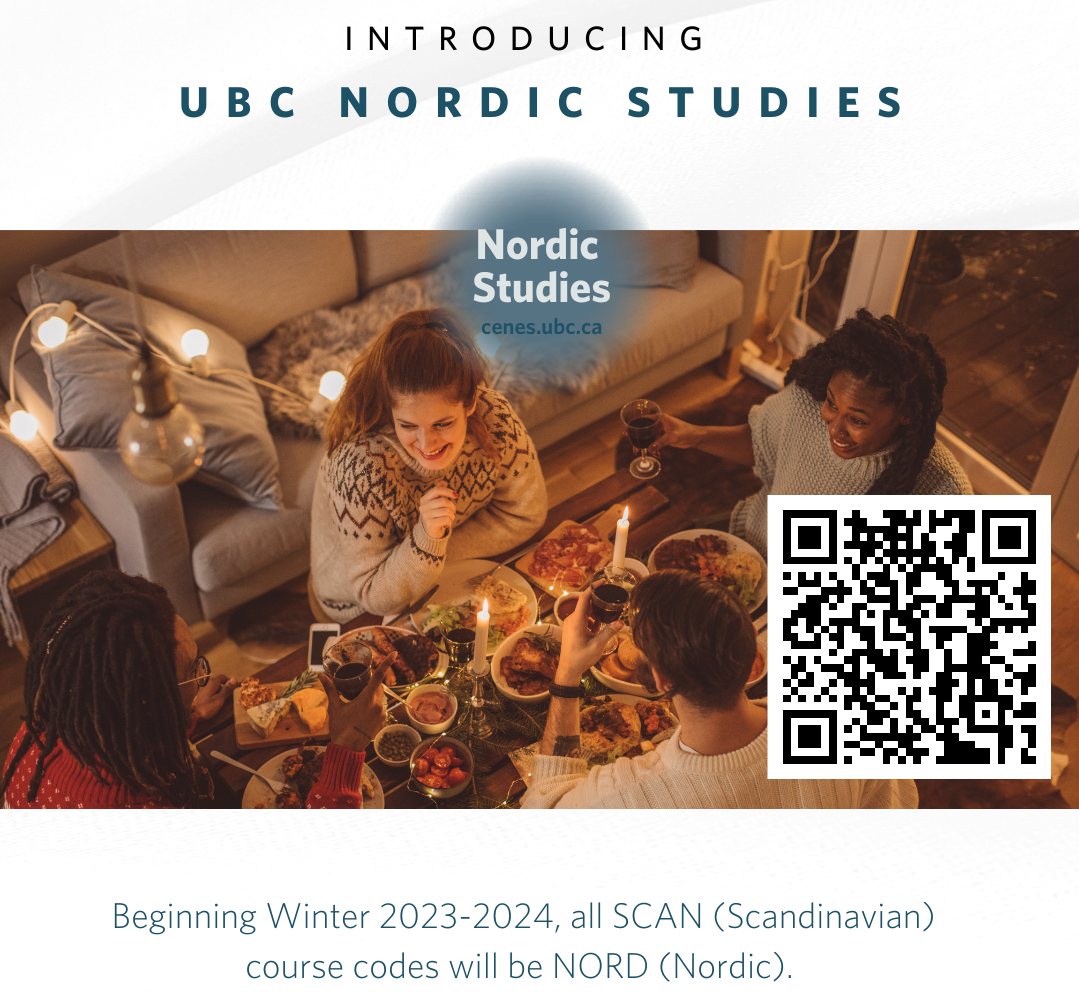The UBC Department of Central, Eastern and Northern European Studies’ Scandinavian Studies program is now Nordic Studies!
Along with the change in the program name, beginning in September 2023, there will be changes in the program course titles and descriptions. Additionally, the Nordic Studies Minor will be easier to complete.
The table below lists all of our Nordic undergraduate courses under their old code (SCAN) and number, along with the corresponding new NORD code and number.
SCAN to NORD Course Equivalencies
| Old Course Code | Old Course Number | New Course Code | New Course Number | New Course Title |
|---|---|---|---|---|
| SCAN | 332 | NORD | 332 | Nordic Studies in Focus |
| SCAN | 333 | NORD | 333 | Nordic Literary Cultures |
| SCAN | 334 | NORD | 334 | Nordic Contemporary Fiction |
| SCAN | 335 | See NORD 338 and NORD 339 | ||
| SCAN | 336 | NORD | 336 | Nordic Crime Fiction, Film, and Television |
| SCAN | 337 | NORD | 337 | Nordic Cinema |
| NORD | 338 | The Viking World | ||
| NORD | 339 | Norse Mythology | ||
| SCAN | 411 | NORD | 411 | Nordic Drama and Film |
| SCAN | 412 | NORD | 412 | Epics of Northern Europe |
| SCAN | 413 | NORD | 413 | Baltic Cultures and Literatures |
| SCAN | 414 | NORD | 414 | Topics in Northern European Cultural Studies |
| SCAN | 415 | NORD | 415 | The World of the Sagas |
New Course Descriptions
Explore selected topics in Nordic cultural studies: art and activism, film and literature, human rights and social justice, migration and minoritized communities, land and climate, national myths and social change.
What gives Nordic and circumpolar literatures their feeling of uniqueness? How are major societal, political and cultural aspects of the circumpolar North reflected in Nordic literatures from various historical periods?
To understand ideas and questions circulating in Nordic societies today, we explore recent literature created in Danish, Swedish, Norwegian, Finnish, Sámi languages, Icelandic, and other Nordic languages.
Why have Nordic cultures offered such thrilling stories about crime, scandal, and danger? How do these Nordic crime stories mirror and critique their societies?
How do Northern European films see the world? What technical, narrative, and aesthetic features give Nordic cinemas a particularly insightful view into the human and more-than-human condition?
What do we know about the history of the Vikings, and how do we imagine their world? We study the wars, migrations, secrets, and many afterlives of the Viking Age.
Odin and Thor, Trolls and Giants: What did the early Scandinavians believe in, and how has their mythology been appropriated and recycled?
How do we know ourselves or others? Life and death, gender, sexuality, and morality are some themes depicted in these influential Northern European art forms.
What is an epic, what makes something “epic”, and why do epic songs of yesterday matter today? Explore epics of Northern Europe, their connections to nationalism, and their re-imaginings today.
A crucial region for geopolitics and intercultural exchange, the Baltic (Estonia, Latvia and Lithuania) remains a crossroads today of cultural, artistic, economic, military, and political fortunes.
Selected topics for advanced study, such as activism, ethnicity, gender, identity, migration, sexuality, and social justice across Northern Europe.
What is a saga? This course explores the medieval and early modern world of the Nordic region, exploring the Icelandic sagas and their literary, cultural, and historical context.
If you have any further questions about Nordic course equivalencies, please reach out to the Director of Undergraduate Studies, Nordic.
